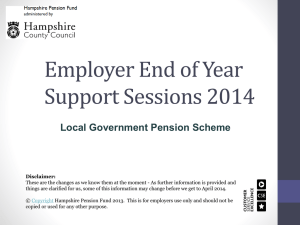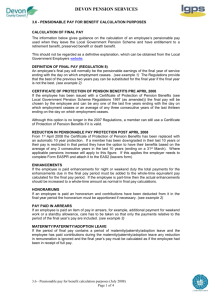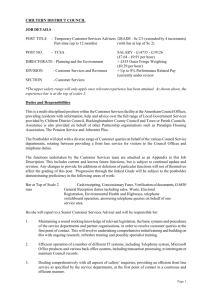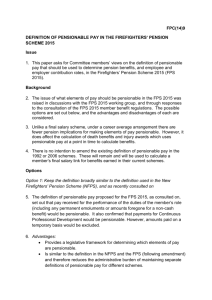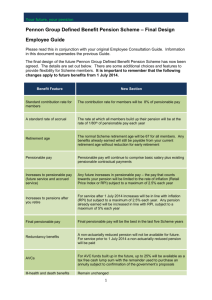YOUR QUESTIONS ANSWERED What does this mean for me? The
advertisement
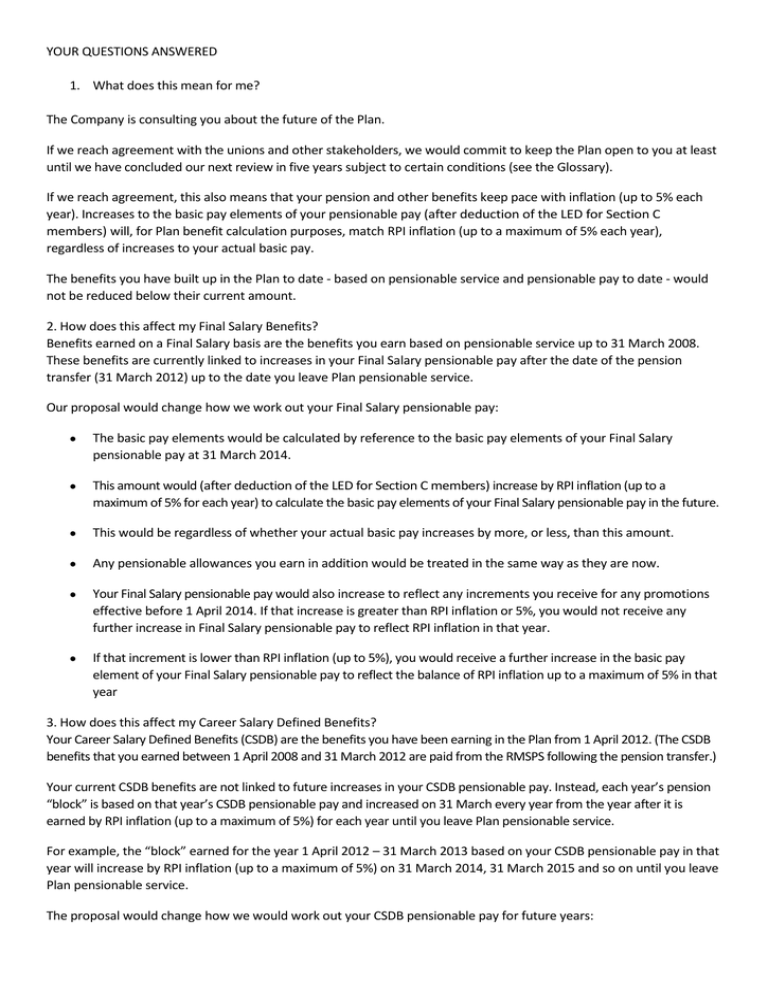
YOUR QUESTIONS ANSWERED 1. What does this mean for me? The Company is consulting you about the future of the Plan. If we reach agreement with the unions and other stakeholders, we would commit to keep the Plan open to you at least until we have concluded our next review in five years subject to certain conditions (see the Glossary). If we reach agreement, this also means that your pension and other benefits keep pace with inflation (up to 5% each year). Increases to the basic pay elements of your pensionable pay (after deduction of the LED for Section C members) will, for Plan benefit calculation purposes, match RPI inflation (up to a maximum of 5% each year), regardless of increases to your actual basic pay. The benefits you have built up in the Plan to date - based on pensionable service and pensionable pay to date - would not be reduced below their current amount. 2. How does this affect my Final Salary Benefits? Benefits earned on a Final Salary basis are the benefits you earn based on pensionable service up to 31 March 2008. These benefits are currently linked to increases in your Final Salary pensionable pay after the date of the pension transfer (31 March 2012) up to the date you leave Plan pensionable service. Our proposal would change how we work out your Final Salary pensionable pay: The basic pay elements would be calculated by reference to the basic pay elements of your Final Salary pensionable pay at 31 March 2014. This amount would (after deduction of the LED for Section C members) increase by RPI inflation (up to a maximum of 5% for each year) to calculate the basic pay elements of your Final Salary pensionable pay in the future. This would be regardless of whether your actual basic pay increases by more, or less, than this amount. Any pensionable allowances you earn in addition would be treated in the same way as they are now. Your Final Salary pensionable pay would also increase to reflect any increments you receive for any promotions effective before 1 April 2014. If that increase is greater than RPI inflation or 5%, you would not receive any further increase in Final Salary pensionable pay to reflect RPI inflation in that year. If that increment is lower than RPI inflation (up to 5%), you would receive a further increase in the basic pay element of your Final Salary pensionable pay to reflect the balance of RPI inflation up to a maximum of 5% in that year 3. How does this affect my Career Salary Defined Benefits? Your Career Salary Defined Benefits (CSDB) are the benefits you have been earning in the Plan from 1 April 2012. (The CSDB benefits that you earned between 1 April 2008 and 31 March 2012 are paid from the RMSPS following the pension transfer.) Your current CSDB benefits are not linked to future increases in your CSDB pensionable pay. Instead, each year’s pension “block” is based on that year’s CSDB pensionable pay and increased on 31 March every year from the year after it is earned by RPI inflation (up to a maximum of 5%) for each year until you leave Plan pensionable service. For example, the “block” earned for the year 1 April 2012 – 31 March 2013 based on your CSDB pensionable pay in that year will increase by RPI inflation (up to a maximum of 5%) on 31 March 2014, 31 March 2015 and so on until you leave Plan pensionable service. The proposal would change how we would work out your CSDB pensionable pay for future years: The basic pay elements would be calculated by reference to the basic pay elements of your CSDB pensionable pay at 31 March 2014. This amount would (after deduction of the LED for Section C members) increase by RPI inflation (up to a maximum of 5% for each year) to calculate the basic pay elements of your CSDB pensionable pay in the future. This means that this part of your CSDB pensionable pay would go up every year regardless of what happened to your actual basic pay, which might go up by less or more than RPI inflation. Increments on your existing grade and pensionable allowances would be treated in the same way as they are for Final Salary pensionable pay. In other words: Any pensionable allowances that you earn above basic pay would be included in your CSDB pensionable pay as they are now. Your CSDB pensionable pay would also increase to reflect any increments you receive for any promotions before 1 April 2014. If that increase is greater than RPI inflation or 5%, you would not receive any further increase in CSDB pensionable pay to reflect RPI inflation in that year. If that increment is lower than RPI inflation or 5%, you would receive a further increase in the basic pay element of your CSDB pensionable pay. If you are promoted after 1 April 2014, your pay increase would be reflected in your CSDB pensionable pay only. Any future increments related to this promotion would, however, not be reflected in your CSDB pensionable pay. Pensionable bonuses would be treated in the same way as they are now. If you are promoted after 1 April 2014, your pay increase will be reflected in your CSDB pensionable pay. If that increase is greater than RPI inflation or 5%, you would not receive any further increase in the basic pay element of your CSDB pensionable pay to reflect RPI inflation up to a maximum of 5% in that year. If that promotional increase is lower than RPI inflation (up to 5%), you would receive a further increase in the basic pay element of your CSDB pensionable pay to reflect the balance of RPI inflation up to a maximum of 5% in that year. Subsequent increments with respect to this promotion would not be reflected in your CSDB pensionable pay, (see above). 4. How would this affect the benefits I’ve built up in the Royal Mail Statutory Pension Scheme (RMSPS) following the pension transfer to the Government? Our proposal would make no changes to the amount that you will receive from the RMSPS. 5. Why is this change necessary? The Company addressed the Plan’s historic deficit last year. This made your past pension, earned up to 31 March 2012, considerably more secure. Unfortunately, because of conditions in financial markets, the cost of your future benefits (from 1 April 2012 onwards) is significant and growing. We will very soon reach a point where we must take action. The trustees of the Plan and the Company are reviewing the cost of the pension you earn each year. Conditions in financial markets would, if we do not take action, lead to a significant increase in the cost of members’ pension benefits. If the Company was required to meet this cost its contributions would increase from around £400 million currently, to closer to £700 million, every year. This extra cost - about £300 million every year - would effectively reverse the cash benefits of last year’s pension transfer. It would put considerable strain on our business. It would be a significant risk to the viability of our Company and your future job security. 6. Is my individual consent required for the Company to implement the proposal? No. The Company is required to consult its employees, but ultimately the Company does not need individual member consent to implement this proposal. 7. Is my Union’s consent required for the Company to implement the proposal? No. The Company would like to reach agreement with the unions but ultimately it does not need union consent to implement this proposal. If no agreement is reached, but the Company still makes this change, the Company would still hope that having made this change it would be able to keep the Plan open at least until we have concluded our next review. However, it would not be able to give any commitment to that effect. 8. Why doesn’t the Company just pay the extra? Our financial performance is improving. However, we need to use the cash that the Company is generating to invest in the future of the business including to complete our modernisation, and upgrade our IT platforms. This is the best way of securing your future, and the future of the Company. 9. How do I know that my views will be taken seriously? We want to hear from you. Although the consultation is not binding, it is governed by specific legislation that ensures your views are heard. 10. How will you pay for any commitment that you give to keep the Plan open? At the moment, if you receive increases to your pensionable pay (such as pay reviews or through promotional increases), that are over and above increases to inflation, your pension benefits increase accordingly. Our proposal would mean that the basic pay elements of your pensionable pay (after deduction of the LED for Section C members) would increase in line with RPI inflation (up to a maximum of 5% each year) whether your actual basic pay increase is more or less. Some of the assets left in the Plan after the pension transfer could then be used to meet the increased cost of providing your future pension benefits. 11. Can you ensure my pension is safe? Through the pension transfer, the Government has taken legal responsibility for the benefits built up in the Plan until the end of 31 March 2012 and increases in benefits each year that are in line with RPI inflation (up to 5% for Section C members) for active members of the Plan. There are no changes to the benefits you will receive from the RMSPS as a result of the Company’s proposal. Our proposal would put the Plan in a better position for the future. It can be delivered without any additional contributions by the Company. If we reach agreement with the unions and other stakeholders as outlined in this booklet, we would commit to keeping the Plan open at least until the next review in five years, subject to certain conditions (see the Glossary). 12. What’s going to happen after five years if you reach an agreement with the unions and other stakeholders? We cannot say what the status of the Plan will be then – five years is a long time. We are committed to being open and honest with you about your pension provision. We will keep you informed about the outcome of the next review as a matter of priority. 13. How much will I pay to the Plan under the Company’s proposal? You will continue to pay 6% of CSDB pensionable pay, if we reach agreement with the unions and other stakeholders as outlined in this booklet. But increases to the basic pay elements of this CSDB pensionable pay (after deduction of the LED for Section C members) will be linked to RPI inflation up to a maximum of 5% each year instead of actual basic pay rises. 14. What happens if I am promoted after 1 April 2014 under the Company’s proposal? Promotional pay rises would not increase your Final Salary pensionable pay, which will be linked to increases to RPI inflation up to 5% each year instead. Promotional pay rises would increase your CSDB pensionable pay but any increments in your new grade would not increase your CSDB pensionable pay (see below). 15. I am in a grade where I get increments – what happens to them under the Company’s proposal? Increments within a pay grade already due for any promotion that happened before 1 April 2014 will continue to apply to both your Final Salary and CSDB pensionable pay calculations. Increments within a pay grade for any promotion that happens on or after 1 April 2014 would not apply to your Final Salary and CSDB pensionable pay calculations. However, you would still receive these increments in your actual basic pay. 16. Some of my allowances are pensionable - will I still earn pension on them under the Company’s proposal? Yes, you would continue to earn pension benefits in respect of any pensionable allowances you receive from time to time in the same way as you do now. 17. My bonus is pensionable - will I still earn CSDB pension for my bonus under the Company’s proposal? Yes, any pensionable bonuses you receive after 1 April 2014 would continue to count for CSDB pensionable pay purposes at the agreed levels. 18. I have taken flexible retirement – what impact does the Company’s proposal have on me? If you have taken flexible retirement and are receiving your NRA 60 pension, the changes to Final Salary pensionable pay would not affect you. They would only have an impact on the part of your CSDB pension that is payable at age 65. If you have taken flexible retirement and are receiving your NRA 65 pension, or all of your pension, and continue to work for the Company, then the changes to the Plan will not affect you at all. Your NRA 60 pension is that part of your pension for pensionable service up to 31 March 2010 that is payable normally at age 60. Your NRA 65 pension is that part of your pension for pensionable service from 1 April 2010 that is payable normally at age 65. 19. I am paying additional contributions to Addplan – what impact does the Company’s proposal have on me? If you are paying additional voluntary contributions to buy extra pensionable service on a Final Salary basis in the Plan, the changes to the calculation of pensionable pay would not change the amount of additional pensionable service that you will buy at age 60. However, if the proposed changes are made, your Addplan benefits would be based on the revised definition of Final Salary pensionable pay (after deduction of the LED for Section C members) as set out at Q2 above. 20. I am paying additional contributions to Bonusplan – what impact does the Company’s proposal have on me? Section C members who are paying contributions to Bonusplan based on the LED may also receive Company contributions if they earn below £30,563. Our proposal would make no change to the way these member contributions to Bonusplan are calculated. 21. If I “buy down” my grade how will this affect my pension under the proposal? The proposal will not affect any decision to buy down your grade and this will work in exactly the same way after the changes as now, other than in relation to the proposed change to how your Final Salary and CSDB pensionable pay is calculated. In other words: Your Final Salary and CSDB pensionable pay will be reduced by the same amount as the reduction in your actual pay. Your new Final Salary and CSDB pensionable pay amounts will continue to increase in line with RPI inflation up to a maximum of 5% each year after the change in grade until you leave the Plan. 22. How will the proposal affect me if I increase or reduce my working hours? We would operate the proposal in the manner needed to ensure that it has the same effect regardless of any change in your working hours. Under the rules of the Plan, Final Salary pensionable pay is usually adjusted to the full-time equivalent for your grade during periods of part-time employment. So the full-time equivalent would increase in line with RPI inflation up to a maximum of 5% under our proposal. Under the proposal, the effect of a change in your hours in relation to your CSDB pensionable pay would be that: Your CSDB pensionable pay would increase or decrease by the same proportion as the increase or decrease in your hours. Your new CSDB pensionable pay amounts would continue to increase in line with RPI inflation up to a maximum of 5% each year after the change in hours until you leave the Plan (or your hours change again in which case the same principles would be reapplied).
